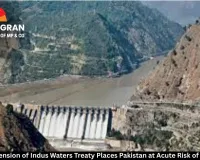Russia’s Massive Antarctica Oil Discovery Sparks Global Alarm: 51 Billion Barrels Could Ignite 2048 Resource Race
Digital Desk

A seismic geopolitical storm is brewing over the frozen continent after Russian research vessels confirmed an astonishing 511 billion barrels of oil beneath the Weddell Sea—more than double Saudi Arabia’s proven reserves—threatening to upend the 65-year-old Antarctic Treaty and trigger a new era of polar power politics.
The discovery, quietly revealed through Russian geological surveys conducted under the banner of “scientific research,” lies squarely within the British Antarctic Territory, prompting an immediate diplomatic protest from London. UK Foreign Secretary David Lammy warned that any attempt to exploit the find would constitute a “flagrant violation” of the 1959 Antarctic Treaty and the 1991 Madrid Protocol, which ban mineral extraction until 2048.
“Antarctica is the world’s last pristine wilderness. We will not allow it to become another oil frontier,” Lammy declared in Parliament.
Why 2048 Matters More Than Ever
The Madrid Protocol’s 50-year moratorium on mining expires in 2048, and experts now fear the treaty system—heralded as one of the Cold War’s greatest diplomatic triumphs—could collapse under the weight of energy hunger. With global oil demand still projected to peak only in the 2030s, the Weddell Sea bonanza represents a strategic jackpot for nations willing to gamble on future deregulation.
Russian state media has remained coy, describing the surveys as “purely scientific,” yet analysts point to Moscow’s expanding Antarctic footprint—five permanent stations and ice-capable research fleets—as evidence of long-term resource positioning.
China’s Silent Power Play
Beijing, meanwhile, is dramatically scaling up its polar presence. Three new stations are under construction, and Chinese icebreakers now conduct joint exercises with Russian vessels. A senior fellow at the Shanghai Institutes for International Studies told state broadcaster CGTN: “Antarctica’s resources belong to all humankind, but responsible stakeholders must prepare for sustainable management post-2048.”
Western intelligence reports suggest Russia and China are already sharing sub-ice seismic data, forging what one leaked U.S. State Department cable called “an axis of polar ambition.”
India’s Delicate Balancing Act
As one of 29 consultative parties with voting rights, India finds itself at a crossroads. Operating two year-round stations—Maitri and Bharati—New Delhi has traditionally championed environmental protection. Yet sources within the Ministry of Earth Sciences acknowledge private concerns that staying on the sidelines could marginalize India when resource rules are rewritten.
“India will never support unilateral grabs, but we cannot ignore strategic realities,” a senior official said on condition of anonymity.
Environmental Doomsday Scenario
Experts warn that drilling beneath kilometer-thick ice shelves in −2°C waters is technological roulette. A single blowout could release an Exxon Valdez-scale spill every week for months, with no realistic cleanup possible in pack ice. The resulting black tide would devastate krill populations—the foundation of the Southern Ocean food web—and accelerate ice-shelf collapse, potentially adding centimeters to global sea levels within decades.
“Even one major accident would make Deepwater Horizon look like a garden sprinkler,” said Professor Claire Parkinson, NASA’s senior climate scientist.
Economic Reality Check
At current Brent prices near $78, Antarctic oil remains uneconomic—extraction costs are estimated at $150–$200 per barrel. But analysts say a perfect storm of OPEC cuts, geopolitical supply shocks, and delayed green-energy transitions could push prices high enough to make the gamble profitable by the 2040s.
Satellite Eyes and Naval Shadows
In response, the U.S., UK, and Australia have quietly tripled satellite surveillance over the Weddell Sea. Royal Navy ice patrol vessel HMS Protector conducted an unannounced transit last month, while rumors swirl of American nuclear submarines mapping the seabed under diplomatic cover.
As 2048 looms, the world’s coldest continent is becoming its hottest geopolitical flashpoint. Will the Antarctic Treaty survive the lure of 511 billion barrels, or will the ice crack first—both literally and figuratively?



.jpg)







